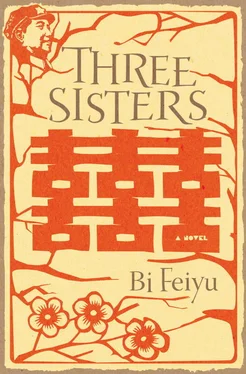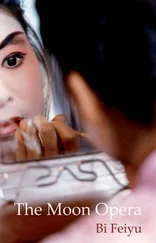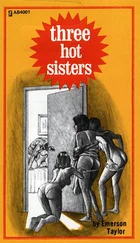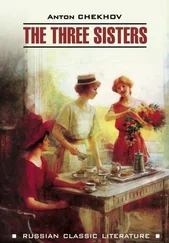Proud, yes, but not so proud that she forgot to announce the implementation of “martial law”: “No more, starting today.” Wang Lianfang frowned in the dark, for he thought getting married meant that he could enjoy sex anytime he wanted. It had never dawned on him that marriage led only to a pregnant wife. When he laid his hand on her belly, he sighed silently, but then his fingers took over and his hand began to move lower and lower. At the last moment, she clutched his hand and squeezed it viciously, a wanton, audacious gesture that signaled her pride of accomplishment. He had a desperate need, but he found no outlet; it was an irrepressible need that grew more urgent the more he tried to suppress it. That went on for more than a week.
Wang never imagined that he would have the audacity to do what he did then. At the brigade office one day, he pushed the bookkeeper to the floor, spread her out, and took her. His eyes must have been red from the urgent need that had been building inside him, although his mind was a total blank at the time. He recalled the details only after the fact, when he picked up a copy of Red Flag and was hit by a shuddering fear. How, in the middle of the day, had he suddenly become possessed by that thought? The bookkeeper, more than ten years his senior, belonged to an older generation, and he was expected to call her aunty. When it was over, she got up, wiped herself off with a rag, pulled up her pants, tied the waistband, straightened her hair, brushed herself off front and back, locked the rag in a drawer, and walked out. Wang found her nonchalance perplexing. He worried that she might kill herself because of what he’d done. If she did, he would definitely lose his job as the commune’s youngest branch secretary. That night he roamed the village till eleven o’clock, keeping his eyes peeled as he searched every corner, his ears pricked for any unexpected sounds. The next day he went to the brigade office at the crack of dawn, where he checked the rafters. Finding no hanging corpse was not reassuring enough. People began to stream in, and when nine o’clock rolled around, in strolled the bookkeeper, polite and cordial as always. Her eyes were not red and puffy, which put Wang enough at ease that he could pass out cigarettes and engage in casual bantering. After a while, she walked up with an account book and a note beneath her finger that said, “Come outside. I want to talk to you.” Since it was a written communication, there was no way to gauge her emotion, and the anxiety that had melted away a short time before came rushing back. His heart was pounding as he watched her walk outside and, looking through the slats in the window, saw her return to her house. Agitated though he was, Wang managed to stay put for ten or fifteen minutes. Then, looking appropriately serious, he took out the Red Flag magazine, rapped the desktop with his finger as a signal for the others to keep at their studies, and walked out the door. He arrived at the bookkeeper’s house alone, where his life as a man truly began. He was not quite a man when he walked through the door, and it was she who taught and guided him to the best times of his life. What kind of husband had he been? There was so much to learn. A battle between the two of them began, one that was drawn-out, difficult, and exhausting, a danger-ridden fight to the bitter end. But they ultimately pulled back from the precipice. He matured quickly, and before long she had nothing more to teach him. Then she looked and sounded terrible; he could even hear her insides collapse and break apart.
Wang Lianfang’s major gain during the battle was the honing of his courage. Actually, he had nothing to fear. Not at all. Nothing bad would happen even if the women did not consent. On this point the bookkeeper had voiced criticism: “Don’t pull down their pants the moment you see them. That makes them seem unwilling.” Shaking that thing between his legs, she examined and criticized it: “You. Don’t you know who you are? Even if they’re unwilling, they need to know you’re the boss. As they say, check the owner before you hit the dog, and if you don’t care about the monk, at least give the Buddha some face.”
There were even more gains to be had from the long, complex struggle that allowed him to see something quite meaningful. In no way an ordinary man, Wang knew something meaningful when he saw it and was expert at discovering the meanings inherent in things. Never content to be just a seed spreader, he saw himself as a propagandist as well, a man who wanted the women in the village to know that every bridegroom was overeager, since foreplay had been alien even to him. Those other men were ignorant of the depth and duration of the struggle or, for that matter, the importance of being thorough. Without Wang, all those women would forever be kept in the dark.
An additional, external factor in the history of Wang’s struggle warrants a brief mention. For a decade or so, Shi Guifang never stopped being pregnant, which meant she was regularly off-limits. She would stand under a tree, one hand on the trunk and the other on her belly, and broadcast her dry heaves throughout the village without a trace of self-awareness. After a decade of this disgusting scene, Wang could hardly bear the ugly sight of her and her dry heaves. She sounded so hollow, so devoid of any viewpoint or stance; and she was oblivious of everything else around her. It was the same every time, embodying the formulaic characteristics of a traditional essay, which displeased Wang immensely. Now Guifang’s only job was to quickly give him a son. But she couldn’t, so what the hell was she dry heaving for? He hated those dry heaves, and the moment he heard one, he’d say, “There she goes again, another report.”
Although he was told “no more” at home, Wang Lianfang did not alter the course of his struggle. And in this regard, Guifang was surprisingly enlightened, unlike many other women, who thought highly of themselves or were simply timid. Wang Yugui’s wife was one of those. Wang Lianfang had slept with her only twice, and she was already displaying a degree of timidity. Standing there naked, with tears and snot flowing, she cupped her breasts, which had now been touched by someone other than her husband, and said, “Secretary, you got what you wanted, so save some, leave a little for my husband.” He laughed at her strange request. Can something like this actually be saved? Besides, why are you covering your breasts? A woman’s bust undergoes several changes: the golden breasts of a maiden, the silver breasts of a wife, and the bitch’s teats of a mother. So what’s she doing cradling those bitch’s teats in the crooks of her arms as if they were gold nuggets? That’ll never do.
Pulling a long face, he said, “Fine with me. There are, after all, new brides every year.” But this woman became a casualty. Even her husband could not get her to have sex with him, and all he could do was beat her to vent his anger. Late at night she was often heard screaming in bed because of Yugui’s fists. Wang Lianfang was finished with her. She’d talked about saving some for Yugui. Apparently she hadn’t.
In more than a decade of dalliances, the Wang Family Village woman who most pleased Wang Lianfang was Youqing’s wife. When he wasn’t dealing with village class issues, she was the subject of all of his thoughts. For him she was a true bodhisattva. In bed it was as if there were no bones in her limp body, which seemed electrically charged. Yes, indeed, he’d found a true bodhisattva. In the spring of 1971, good news cascaded down on Wang like a sow expelling a litter of piglets: first he was given a son, then Yumi found a future husband, and now he was the beneficiary of the spark plug in Youqing’s wife.
Peng Guoliang’s return letter traveled far. First to Wang Family Village Elementary School and then to Gao Suqin before it landed in Yumi’s hand. She was washing diapers at the pier nearest the school when it arrived. In the past she had done the washing at the pier near her house, but that had changed, for once a girl has something on her mind, she prefers doing things away from home. With her back bent, she scrubbed the diapers, each of them soft and pale as if they were burdened with worry. As her hands busied themselves with work, Yumi’s mind was consumed by Peng’s return letter and what it might reveal. She tried to predict what he would say to her, but of course, she couldn’t imagine the future. That brought her no small measure of sadness, for in the end, her fate was in the hands of someone whose inclinations remained a mystery.
Читать дальше











